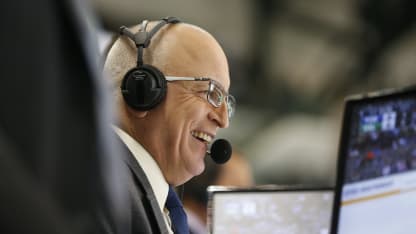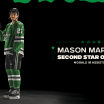Let's start here, in a broadcast booth. Where else would a story about Dave Strader begin?
Last April at the Verizon Center in Washington, several hours before what would turn out to be a classic double-overtime playoff thriller between the host Washington Capitals and the Toronto Maple Leafs, Strader was where he was most at home.
The ice fresh. The building almost silent. Dave Strader going over notes, but making time to talk hockey and life or, more to the point, mortality with a visit.
Not just his own mortality, but in some ways maybe everyone's mortality, and what it means to be confronted by that mortality.
It's a good memory to hold onto with the news of Strader's passing on Sunday after a long battle against a rare form of bile duct cancer.
Dave Strader: Incredible voice, better man
A Hall-of-Fame television legend, the man affectionately known as "The Voice" touched countless lives

He is survived by his wife, Colleen, and three sons and two grandchildren. But in many ways, the man known simply -- and with great affection -- as 'The Voice' is survived by an entire game.
Former NHLer and longtime analyst Darren Pang was more than a broadcast partner with Strader for many years, he was a friend. Last spring, he told a great story about putting scotch tape over Strader's glasses one night when Strader was struggling to keep Pat Verbeek, Steve Yzerman and Slava Kozlov straight on the ice during a Detroit Red Wings broadcast. The problem was the tape wouldn't come off when Strader put the glasses back on to resume the game broadcast.
He never missed a beat, though.
On Sunday, Pang sent a picture taken shortly before Strader's passing -- the two pals together, smiling as though neither had a care in the world, even though it was Pang's opportunity to say goodbye.
It is a picture that is both timeless and heartbreaking.
While Strader was recovering, Pang said there wasn't a day went by that he didn't think about his good friend. And when Strader returned to broadcast games in Dallas, the moment was overwhelming.
"I was full of emotion," Pang said in an email Sunday. "Cried my eyes out. Happy, proud and also stunned that he was so sharp. So sharp. Like he never left the booth. Like he was 30 years old. It gave us all such hope. How can he not return with his health?"
It was not to be, of course, but Pang leaves little doubt about what he feels will be Strader's legacy.
"His legacy as a person will be greater than that as a broadcaster, if that's possible," Pang said. "When we were at ESPN, the schedule would come out and I tell you that when any of us saw 'Strader' on your game, you knew it was going to be a well prepared game, a fun game, a stress-free game."
"Ask any producer, director, audio person, etc about being part of a game with Strades. You will get the same answer from all," Pang added. "Everyone adored him, his prep and his call; everyone. I will miss him dearly. The sporting world will miss him. His legacy will forever live."
There are two parts to this.
First, the powerful sense of loss, even as friends understand the difficult times that Strader had endured in recent months as he ultimately gave way to the disease that had first appeared near the end of the 2015-16 season.
It is the feeling of loss that comes from an immense respect for Strader's work, his dedication to the craft and his humility.
It's what made his return to the booth, first for a five-game stint with the Stars, and then for that short period of time last spring during the playoffs, so magical.
Like Toronto head coach Mike Babcock stopping a media scrum, explaining his rationale on challenging a Washington goal, to recognize Strader's presence.
That such a thing would happen seemed to surprise Strader, but it shouldn't have.
Veteran broadcaster and longtime NHLer Bill Clement said he was filled with "elation" listening to the games Strader was able to call last season -- the kind of joy you felt at a family member's graduation or other momentous event.
"Dave's goodness kind of radiates," Clement said at the time. "He touches other people's lives."
Strader, 62, was able to return to Dallas for five games last season. Team president Jim Lites, who first got to know Strader in the late 1970s when Strader began calling games for the Detroit Red Wings' farm team in Adirondack, sometimes appearing on the broadcasts as an impromptu analyst, had hired Strader before the 2015 season.
On the first night of Strader's return last season, forward Antoine Roussel ran into Strader before the game and the two chatted. Later, Roussel would score three times as the Stars came back to defeat Tampa Bay. Another moment that makes you wonder about karma and such things.
Video: Remembering Stars voice Dave Strader
"It was cool to see him doing a last push," Roussel said Sunday. "Just showing he was battling hard. For us, he was inspirational."
"Such a great voice for the game," Roussel added. Normally, the guys have games on mute -- but not when Strader was calling them.
"The smile he bring every day. He was just happy all the time," Roussel said. "It's a memory I'm going to keep from him."
At the end of that game, the Stars, led by captain Jamie Benn and Tyler Seguin, stood at center with their sticks raised in tribute to Strader. A picture of that tribute greets players in the Stars' practice facility dressing room in Frisco every day.
The virtual tidal wave of tributes on social media following the announcement of Strader's passing merely reaffirm all those things we knew about Strader and his place in the game.
Incredibly sad to hear about the passing of @TheVoiceDS. Iconic in his work but a even better friend. May you rest in peace buddy. pic.twitter.com/Mm60OpkdcL
— Tyler Seguin (@tseguinofficial) October 1, 2017
Sad to hear the news this morning about our friend Dave Strader. Big part of the Dallas Stars family and will truly be missed.
— Jamie Benn (@jamiebenn14) October 1, 2017
Such a terrific person
— Daryl Reaugh (@Razor5Hole) October 1, 2017
So much love for his family, support for friends, time for all
And an absolute titan in a booth, a gondola or a perch pic.twitter.com/FgpqJmuLhm
On the wall as the players hit the ice. Another of many reminders that Dave is always in our hearts, and will remain a big part of this team pic.twitter.com/edQfifsx9a
— Josh Bogorad (@JoshBogorad) October 1, 2017
"To me, the thing that always stood out every time I saw him, was class and dignity," Dallas head coach Ken Hitchcock said. "That's to me who he is. And that's what he exemplified. He just had this way he carried himself that he seemed to be above the fray all the time. He was sincere. And I knew a lot of people that knew him in Adirondack and stuff like that, and he was a guy, to me, that everybody really, really enjoyed being around, and his sincerity, really to me, shone through on a daily basis."
But what will stay with us forever, what remains on this day a powerful lesson in strength and character, was how Strader viewed his own role in a story whose ending seemed inevitable.
He recalled for us a night in a hospital in Boston after his diagnosis, and the promise he made to himself.
"I said, 'I'm not going to let this define me,'" Strader recalled. "I don't want it to be the all-consuming, everyday worry of everybody around me. And I've always been an optimistic person. I'm a glass-half-full guy anyway, so I said, 'I'm going to portray that and hope that it rubs off on my family and friends].' And it has."
And it did. Right to the very end.
A few days after our conversation, Strader was informed he was the recipient of the Foster Hewitt Memorial Award for 2017 and would be honored during Hall of Fame induction weekend in Toronto this November.
It goes without saying that the moments will be more than a little bittersweet for all who knew him.
But we recall the advice that Strader's brother, a doctor, gave him after the diagnosis that he should try as much as possible to push the horizon back one day at a time, because you never knew what every new day might bring.
Strader embraced that advice, even as it became clear the horizon would be pushed no further.
And so let's end here. In a broadcast booth. Doesn't matter where, because where else would we end a story about Dave Strader?
**This story was not subject to approval of the National Hockey League or Dallas Stars Hockey Club. You can follow Scott on Twitter [@OvertimeScottB, and listen to his Burnside Chats podcast here.**


















